|
Last updated
02/06/2011 |
| |
Notts Indymedia | 21.09.2006 00:04 | Ecology | Nottinghamshire
NAIL supporter | 20.09.2006 20:41The campaign has been a real community effort. After the first public meeting in the area of Sneinton, which is most affected by the incinerator, more and more local residents have got involved in different levels. A year ago, all political parties within the council were in favour of expanding the incinerator. The facility with the ability of gaining heat from waste was seen as a good thing. Much effort from the campaign has been put into informing councillors about the real concequenses.
One of the first obsticles was the license to operate, which the incinerator needs to operate at the larger capacity. The application is reviewed and the license issued by the Environment Agency (EA), who on numerous occassions has been picketed by campaigners. The license was granted by the EA. Some campaigners, who are part of a group called 'the Mischief Makers' have tried to bring a more creative element to the campaigning work. The 'Rubbish Day Out' was held twice to rally local support in Sneinton as well as showing what can be made by re-using waste and raising some money. Different banners were hung from houses in the area and it seemed no-one could deny the issues at stake anymore. A mix of lobbying, letter writing, taking action and raising awareness seemed to push local
politicians finally to take the issue on board. Early summer it seemed both LibDem and Conservative as well as Labour councillers were turning their backs on the plans. Now the application has unanimously been rejected. WRG might appeal, although it now seems they don't seem to have as strong a case as previously thought.
Notts Indymedia (back to Incineration in Europe)
|
| |
|
| |
IRELAND - Urgent Action Required if Minister Gormley Serious About Moving Away From Incineration
Press Release
16 October, 2007, Ireland. Todays decision by An Bord Pleanala to grant permission to Indaver Ireland for a 50,000 tonne increase to their proposed Meath incinerator flies in the face of government declarations that incineration is no longer the cornerstone of Irish Waste Management Policy.
Environment Minister John Gormley needs to take urgent action if he is serious about moving away from incineration.
"We are very disappointed in this decision by An Bord Pleanala. Building incinerators before alternatives will ensure that Irelands waste industry is incinerator dominated.
Moving away from incineration is recommended by both the September 2006 Oireachtas Report on Waste, and Dr Dominic Hoggs report - Waste Policy Planning and Regulation in Ireland. The Hogg Report states that a mix of Mechanical Biological Treatments (MBT) is more suitable for Irelands needs, more economically viable and with a shorter lead in time, which would allow Ireland to meet 2010 deadlines for landfill diversion" said a CHASE spokesperson.
The Green Party claim that they remain committed to a NO INCINERATION POLICY. If the Green Party in Government wants to maintain credibility Minister Gormley needs to:
Immediately introduce the promised incinerator levy (while keeping the landfill levy).
Incentivise, as a matter of urgency, the alternative technologies he has proposed in order to meet the 2010 deadlines
CHASE is opposing the construction of a 100,000 tonne toxic waste incinerator and a 100,000 tonne municipal waste incinerator at Ringaskiddy, Co Cork. Planning, which applies only to the toxic waste incinerator, is being appealed. The Case is listed for hearing at the High Court on 30 October, 2007.
ENDS
_____
For further information:
Mary O'Leary, 086 8177737 021 4811952
Linda FitzPatrick, 021 4374506 087 7410849 (back to Incineration in Europe) |
| |
|
| |
|
Global Movement Call Out for Sustainable Alternatives to Waste Incineration |
| 28 September 2007, Hondarribia, Spain/ Buenos Aires, Argentina/ Berkeley, CA, USA/ Manila, Philippines.
“We don’t want incineration, we know there’s a better way!” This message resounded in a song from the voices of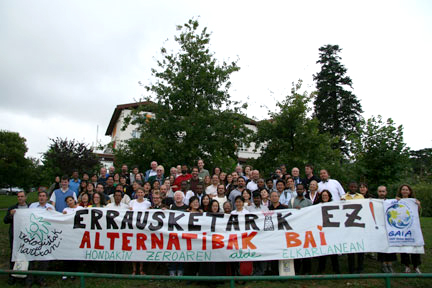 130 people from 39 countries at a meeting last week by the Global Alliance for Incinerator Alternatives (GAIA) in Hondarribia, in the Basque region of Spain. 130 people from 39 countries at a meeting last week by the Global Alliance for Incinerator Alternatives (GAIA) in Hondarribia, in the Basque region of Spain.
GAIA members and allied groups gathered from around the world to challenge the toxic impact of waste incineration and to call attention to the strong connection between waste disposal, climate change and social injustice.
Photo: GAIA Global Meeting participants hold a big banner in Basque language- Incineration, No. Alternatives, Yes! Photo by Gigie Cruz, GAIA |
| “Participants from all continents were as surprised as disappointed to learn that the EU is considering to reclassify waste-to-energy incineration as recovery. *The EU is considered to be a world leader in environmental protection but the reclassification is a step back that can set a dangerous precedent for sustainable environmental policies in the rest of the world*.” said Joan Marc Simon, Waste Policy officer of GAIA. Speakers exposed the large amount of greenhouse gas emissions that are released into the atmosphere and the energy that is wasted when materials are incinerated rather than repaired, reused and recycled. Strong opposition was expressed against national and international policies that are falsely promoting incineration as a source of renewable energy. |
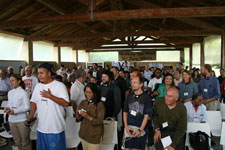
Participants stand up against incineration when called during the introduction. Photo by Gigie Cruz, GAIA |
“We specifically oppose moves to reclassify incinerators as waste recovery in the European waste legislation. This reclassification would act as an incentive to build new incinerators, and seriously undermine recycling and other ecological and sustainable systems and approaches for managing discards,” said Monica Wilson, Co-Coordinator, GAIA. Success stories were also shared about existing “zero waste” models in communities around the world—proving that alternatives to wast incineration and landfilling exist that are healthy for communities and
the planet. |
|
| In countries such as Italy or Spain successful “zero waste” experiences are taking place. "... in Italy in only three years numbers of municipalities having more 50% of diversion has doubled, numbering more than 1000 nowadays. *Novara has reached over 70% in 12 months, Treviso Province has 77,5% of
diversion. Capannori in Tuscany has been the first italian Municipality to declare ZERO WASTE by 2020 and now has 82% of diversion. With this figures incineration -with energy recovery or without- is just not an option* because it would only bring inefficiency.” said Rossano Ercolini from Ambiente e Futuro in Italy.
“In Catalonia we have proven that good waste management policies reduces waste going to landfills and renders waste-to-energy incineration unnecessary. We have municipalities that recover more than 50% of the waste, if this model is applied to the rest of the country no incineration would be needed” said Víctor Mitjans from CEPA-Ecologistes de Catalunya.
Participants provided information about cities such as Buenos Aires, San
Francisco and others which have developed innovative zero waste programs that are leading to the elimination of incinerator and landfill waste disposal.Successful strategies discussed include bans on wasteful product packaging and plastics, city-wide composting of organic materials, and laws that require producers of difficult to recycle products such as computers to take responsibility for their products when they are discarded. |
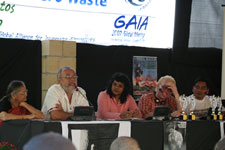
Regional representatives share their experiences on waste issues. Photo by Gigie Cruz, GAIA
|
The meeting was held in the town of Hondarribia in the Basque region of Spain in order to support the efforts of local community groups, which have been successful in defeating two recent proposals for the construction of incinerators.
Activists from the local and neighboring community were a strong presence throughout the meeting. A statement of support for their campaign against incinerators and for zero waste in the Basque region was issued and adopted by all meeting participants.
- end - (back to Incineration in Europe) |
|
|
| |
|
| |
|
|
| Hondarribia, Spain, 17 September 2007. "Stoppt die giftschulden" German for `stop toxic debt´) was the resounding plea of public health and environmental activists in support of the Philippine civil society campaign to halt payment for a controversial Austrian development aid package that included the shipment of 26 extremely dirty incinerators for medical waste. The over 125 activists from 39 countries attending a global meeting on incineration issues in Hondarribia, Spain, signed a letter addressed to Dr. Alfred Gausenbauer, Federal Chancellor of Austria, appealing to his government "to rectify the gross injustice" by canceling the loan originally amounting to ATS199.96. The Bank of Austria and the Department of Finance of the Philippines signed the loan in 1997.
|
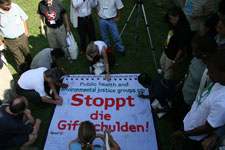
Public health and environmental activists across the globe sign a banner supporting a Philippine campaign to stop loan payment to Austria for defunct medical waste incinerators during an international meeting on incinerator problems and alternatives held in Spain. (Gigie Cruz, GAIA)
|
In their letter, they slammed the loan package as "a case of toxic technology transfer" that practically caused the dumping of highly defective incinerators in 26 public hospitals in the Philippines. Emissions test conducted by the Department of Health and the World Health Organization showed that the incinerators release dioxins and
furans and other harmful chemicals way beyond the standards set by the Philippine government. These incinerators were decommissioned in 2003 to comply with the requirements of the country´s Clean Air Act."We find it totally unjust and indefensible for both the Governments of Austria and the Philippines to be carting off funds for the public coffers to pay for obsolete and dangerous waste burners," said Alan Watson, UK-based member of the Global Alliance for Incinerator Alternatives (GAIA). "Why should the country´s poor suffer
from this apparent dumping of dirty incinerators from Europe?" Watson asked.
The activists found it appalling that the $2 million per year loan repayment is depriving the Filipinos with funds to improve health care waste management in hospitals and meet the people´s health needs. The allotted payment for 2007 is 25 per cent of the Department of Health´s budget for infrastructure and almost equal to the budget for local health programs and the prevention of emerging diseases.
They emphasized the need for Austria to take unilateral action of canceling the debt since the Philippines has yet to rescind a controversial law that automatically appropriates budget for international debt obligations above all other public expenses.
(back to Incineration in Europe) |
|
|
| |
|
| |
|
|
| 30 July 2007, Quezon City, Philippines- Two broad coalitions of citizens’ groups called today on both the national government and the Austrian government to annul a half a billion peso “toxic debt” that financed a failed Department of Health (DOH) project involving the importation of twenty-six medical waste incinerators for DOH-run hospitals in the country. The Ecological Waste Coalition of the Philippines (EcoWaste) and the Freedom from Debt Coalition (FDC) said during the public launch of the “Stop Toxic Debt Campaign” that the loan, which was contracted in 1997 between Bank Austria and the Philippine Department of Finance (DOF), will have to be paid until 2014. |
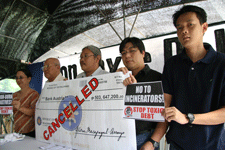
Representatives from different civil society groups Neneng Jocson from SAC Cabanatuan, Bishop Julio Labayen, Milo Tanchuling of Freedom from Debt Coalition, Von Hernandez of Greenpeace/GAIA, and Ronnel Lim of the Ecowaste Coalition call for the annulment of the half-billion Austrian loan to finance obsolete incineration technology. Photo by Gigie Cruz
|
| But the incinerators, which Greenpeace Southeast Asia claimed in an earlier report were substandard and did not meet the emission levels guaranteed by the supplier, had all been retired in 2003, when the incineration ban promulgated by the Philippine Clean Air Act of 1999 (CAA) took effect. The loan financed the DOH’s project dubbed “The Austrian Project for the Establishment of Waste Disposal Facilities and Upgrading of the Medical Equipment Standard in DOH Hospitals.” It was originally intended to provide development assistance to Philippine hospitals in the area of medical waste management.
In 1997-1998, the incinerators with capacities of 300-500 kg of waste/day, a major component of the project, were set up in the various DOH-run hospitals throughout the country.
The payments on the loan’s principal have commenced in 2002 and the loan now represents a two-million dollar per year debt burden for the Philippines until 2014.
Toxic technology transfer
According to Von Hernandez, Campaigns Director of Greenpeace Southeast Asia, the incinerators exported by Austria to the Philippines were of such low quality that they would never have been allowed to operate in Austria. The incinerators, however, were granted an exemption from the Environmental Impact Assessment process by the Department of Environment and Natural Resources (DENR).
A subsequent assessment of the incinerators’ emissions, jointly conducted by the DOH and the World Health Organization (WHO), revealed extremely high emissions.
According to Ronnel Lim, EcoWaste Coalition researcher: “Even if the incineration ban of the CAA never took effect, the incinerators’ emissions were outrageously high there was simply no way to defend them. In the joint DOH- WHO emission test conducted on one of the incinerators, the dioxin emission was a whopping 870 times the limit set by the CAA.”
Money to burn
FDC secretary-general Milo Tanchuling pointed out that the incinerator loan is a classic example of an illegitimate debt that was ““incurred to finance an ill-conceived development project that posed danger to our environment and the people.”
“Such debt is unacceptable and must not be honored. We call on the Austrian government to cancel and on the national government to repudiate the loan,” added Tanchuling.
Hernandez of Greenpeace Southeast Asia also called for the deal to be rescinded: "Filipinos will not tolerate being at the receiving end of toxic technologies. It is totally outrageous that we are paying for an obsolete and deadly technology. We are being cooked in our own juice."
Bishop Julio Labayen, joining the two coalitions, also vowed to bring the campaign to cancel the incinerator debt to Austria. He also appealed for the DOH and the Department of Finance to closely look into the loan agreement and seek ways to divert the loan payments to environmentally-friendly, non-burn medical waste treatment technologies
instead.
Bishop Julio Labayen said that what makes the loan unconscionable is that the Philippine government is practically throwing money away at the same time that it is progressively cutting back on health outlays.
In the past 10 years, the DOH's budget as a percentage of the total national budget has decreased from about 2.53% in 1998 to just over 1% this year. Health expenditures have perennially lost out to debt service payments and national defense on the government's priority list.
(back to Incineration in Europe) |
|
|
| |
|
| |
National anti-incineration events
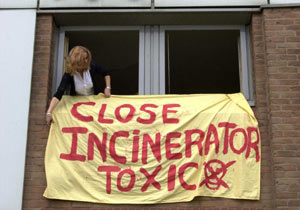
National protests against incineration have been organised across the UK today. Several anti-incineration groups are taking part in the Global Day of Action to call on government and industry to stop burning waste and to start recycling.
Why not see what your local group is doing for anti-incineration day or have your say by contacting Maragret Beckett.
London Against Incineration:
Local residents will take to the streets in protest against Edmonton incinerator and to campaign for a zero waste solution. Banners will also be hung across the North circular in London.
The day begins at 3.30pm at Raynham Terrace school, Edmonton and later move on to Angel corner.
Essex
A protest at the county council's continuing refusal to start the processes necessary to change the wording of a policy on the Waste Plan which permits incinerators to be built at six sites in Essex.
A spoof trial and protest will be held at Chelmsford County Hall at 11am on Monday 17th June.
Sheffield incinerator
South London Against Incineration
A candlelight vigil will be held by the group at the South East London Combined Heat and Power (SELCHP) incinerator in Lewisham. The group will be gathering outside on Monday 17th June from 7pm to 8.30pm.
(back to Incineration in Europe)
|
| |
|
| |
The French government has defended its waste policies after it was urged by environmentalists and two former environment ministers to abandon waste incineration and concentrate more on waste reduction.Environment minister Nelly Olin denied claims made during an annual anti-incineration campaign last week that French waste incinerators pose a threat to public health and the environment. New standards introduced in January guarantee a "high level" of protection, she said (EED 06/07/06).
She also announced a plan to promote household composting in addition to existing proposals to reduce the amount of household waste going to landfills or incinerators (EED 22/09/05).
French incinerators have a history of inefficiency and high-dioxin emissions (EED 20/06/02) and their situation is likely to play a role in the current debate in Brussels on a revised EU waste framework directive.
In June, the European parliament's rapporteur on the law, Caroline Jackson, complained that European commission proposals to impose efficiency criteria on incinerators would penalise all but fourteen of France's 85 plants (EED 26/06/06).
(back to Incineration in Europe)
PRESENTATION OF THE GRENELLE ENVIRONMENT FORUM CONCLUSION SPEECH BY M. NICOLAS SARKOZY,PRESIDENT OF THE REPUBLIC
From the web site of the embassy of France in Canada:
http://www.ambafrance-ca.org/article.php3?id_article=2002
Paris, 25 October 2007
The French President organized what we called "le Grenelle de l'environnement," that is to say a large and open dialogue between government, NGOs, Unions, business and local communities. More than 300 people participated in working groups during four months, between July and October, and 300.000 people gave their views and ideas on the web site created for the occasion. Through this process which will now move on towards its implementation phase, France intends to demonstrate its determination to protect the environment in a way that will be consistent with a more robust and sustainable economic growth. We, as industrialised countries, need to set the example if we want to make a difference and convince all our foreign partners that we are serious about protecting our planet and ensuring the well-being of future generations.
WASTE MANAGEMENT
We will also apply this principle to our waste management policy. Priority will now be given to avoiding waste, rather than merely treating it. We will adopt every proposal that enables us to prohibit or tax unnecessary waste such as excessive packaging. Priority will no longer be given to incineration but to recycling. Proof will be required of every new incinerator project that it is a last resort. There will be no more incinerators without permanent and transparent monitoring of pollution emitted. There will be no more incinerator projects that do not generate energy from waste incineration. Having set out these principles, I know that you have not concluded your work on this point and that the work of the Grenelle must continue. The government looks forward to your conclusions.
(back to Incineration in Europe)
|
| |
How you can get involved
|
|
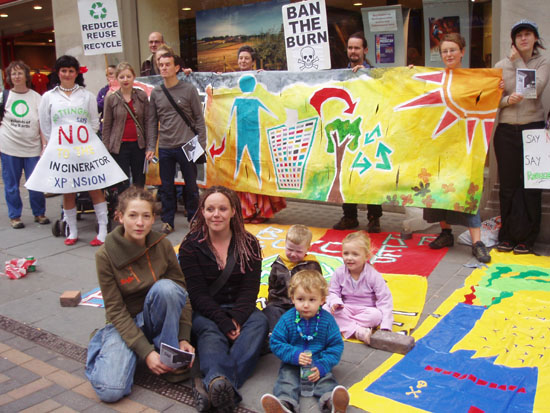

 130 people from 39 countries at a meeting last week by the Global Alliance for Incinerator Alternatives (GAIA) in Hondarribia, in the Basque region of Spain.
130 people from 39 countries at a meeting last week by the Global Alliance for Incinerator Alternatives (GAIA) in Hondarribia, in the Basque region of Spain.





